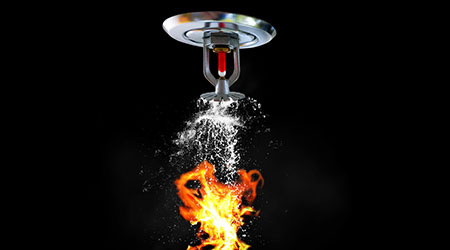If fire suppression systems don’t operate when they should, both lives and property are put at risk. Fortunately, these systems usually do work as intended, according to an article from Building Operating Management on the FacilitiesNet website.
A study by the National Fire Protection Association, “Sprinklers in Reported Fires during 2010 to 2014,” found that sprinklers operated effectively in 88 percent of fires in which they were present and the fires were large enough to activate them. And when they operated, sprinklers effectively controlled the fires 96 percent of the time.
To ensure the sprinkler heads are unobstructed, building owners or facility managers should regularly inspect them. If a sprinkler head is inadvertently painted, or if debris is caked on, it usually will need to be replaced.
It’s also critical to inspect beyond the sprinkler heads. Make sure the water supply valves are open, make sure normal pressure is apparent on the gauges, and make sure the fire sprinklers aren’t obstructed by storage piled too high or other items. NFPA 25 provides information on the required type and frequency of inspections, he adds, noting that it can vary with the type of system.
In addition, in all buildings, a deeper inspection is periodically required. This entails opening the system and checking for corrosion and obstructions within it, among other things.

 What 'Light' Daily Cleaning of Patient Rooms Misses
What 'Light' Daily Cleaning of Patient Rooms Misses Sprinkler Compliance: Navigating Code Mandates, Renovation Triggers and Patient Safety
Sprinkler Compliance: Navigating Code Mandates, Renovation Triggers and Patient Safety MUSC Board of Trustees Approves $1.1B South Carolina Cancer Hospital
MUSC Board of Trustees Approves $1.1B South Carolina Cancer Hospital Study Outlines Hand Hygiene Guidelines for EVS Staff
Study Outlines Hand Hygiene Guidelines for EVS Staff McCarthy Completes $65M Sharp Rees-Stealy Kearny Mesa MOB Modernization
McCarthy Completes $65M Sharp Rees-Stealy Kearny Mesa MOB Modernization